What is worse than doing the work to sort, wash, and fold your laundry just to discover that your clothes smell worse than before?! If this has happened to you, you know how frustrating it can be. It seems counterintuitive to pull – what should be – clean clothes from the washing machine to find a pile that smells less than fresh. I’m sure this leaves you wondering – why do my clothes smell after washing?
Clothes that have just been washed can retain smells for several reasons – the leading amongst them is that the washing machine needs to be cleaned. Techniques used for washing – such as the amount of detergent used – can also create foul-smelling clothes.
In this article, we will cover 8 of the top reasons that clothes smell after washing, as well as what to do if you find yourself in this situation. We will also discuss why clothes can smell after being dried – even if they went into the dryer smelling clean.
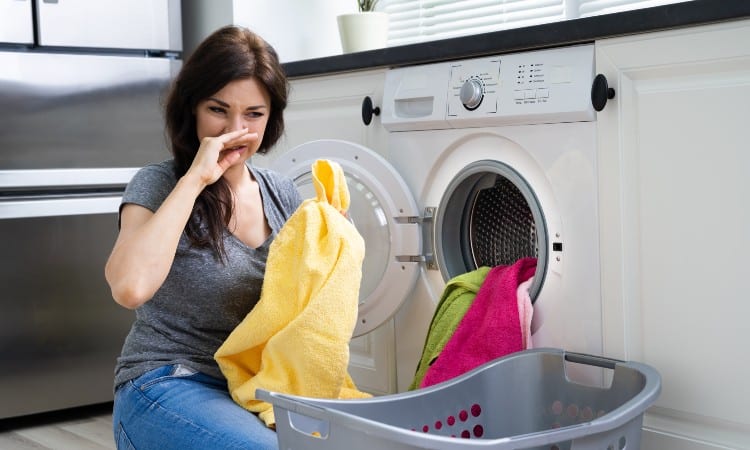
Quick Navigation
Why Do My Clothes Smell After Washing: 8 Reasons
No one expects to go through the laundry process to realize it was all for naught. Nothing is more frustrating than completing a tedious chore than having to repeat the work twice. The good news is – there is probably a pretty simple solution to why clothes still smell even after being washed. Below you will find 8 common reasons that just cleaned clothes might not smell so fresh.
1. The Washing Machine Needs to be Cleaned
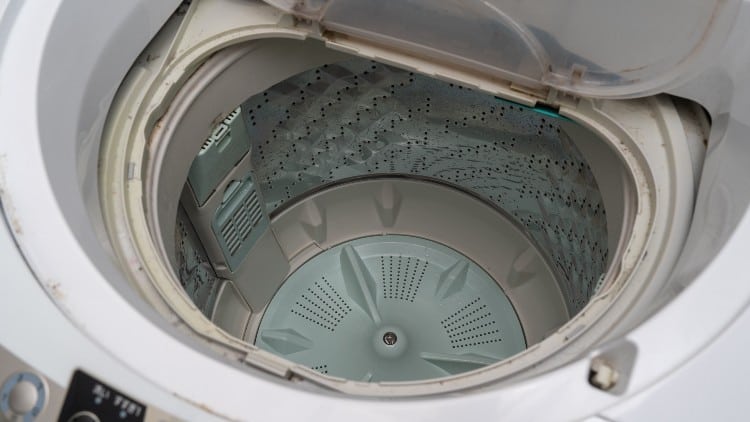
Washers are cleaning machines – so it’s no surprise that cleaning them may often get overlooked. The truth of the matter is, though, that washing machines can harbor a lot of gunk and grime. The constant moisture – combined with the cleaning products we use – leaves washing machines as perfect breeding grounds for mold and mildew – the source of a lot of smelly laundry.
Washing machines should be kept up routinely. Allowing the drum to dry completely between uses – and wiping down any places where moisture can easily be trapped – can make a world of difference. Liquid detergent trays are especially notorious here. In addition to this routine maintenance – washing machines should undergo a deep clean at least once a year, ideally every six months. Especially if your machine gets a lot of action.
Deep cleaning a washing machine may sound like a serious undertaking, but fortunately, it’s pretty hands-off. All you need are basic household supplies – distilled white vinegar and baking soda – and you can have your machine fresh when running a cycle or two.
For a front loading machine – pour 2 cups of vinegar into the soap dispenser and sprinkle half a cup of baking soda in the drum. Set the machine to its longest cycle with the hottest water, and let it do the work! Once it’s finished – give it a thorough wipe down and leave the door ajar to dry.
For a top loading machine – Pour 2 – 4 cups of vinegar into the drum and set it to run on its hottest temperature setting. Once the machine has filled with water, pause the cycle and let it sit for an hour. Once the cycle is complete – add a cup of baking powder to the drum and run once more on the same settings. Wipe down the machine and leave the door open to dry once the second cycle has finished.
2. Too Much (or Too Little) Laundry Detergent
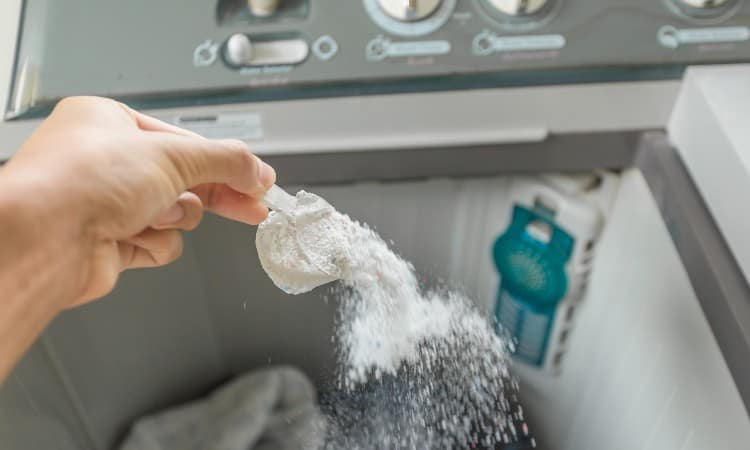
You wouldn’t think that the substance meant to clean the clothes could be the source of the bad smell behind them – but it can. Laundry detergents are highly concentrated – it may not look like much is being poured in, but once water is added, it multiplies exponentially. If too much detergent is added to a wash cycle, it becomes impossible for the machine to thoroughly rinse it all away. Contrary to how it might seem, this will lead to the attraction of dirt and bacteria, leaving clothes dirty rather than fully clean.
This goes double for front-loading washing machines. High-efficiency front loaders are designed to use much less water. This means there is even less power to wash away detergent – let alone an excessive amount. To avoid smelly clothes from detergent overuse, resist the urge to add “just a bit” more.
Another downside to being heavy-handed with the soap is that buildup can occur over time. This leads to a dirtier machine that will need to be deep cleaned more often. Powdered detergents tend to leave less residue, so it could also be beneficial to use this type over liquids.
Alternatively – if you put a load of dirty clothes into the washer and don’t add enough detergent, the water alone won’t always have the power to get things completely clean. Without enough soap – the sweat, dirt and grime on the clothes won’t be washed away – leaving smells even after clothes are pulled from the machine. Your best bet on laundry detergents is to stick to the product’s guidelines.
3. Overfilling the Machine
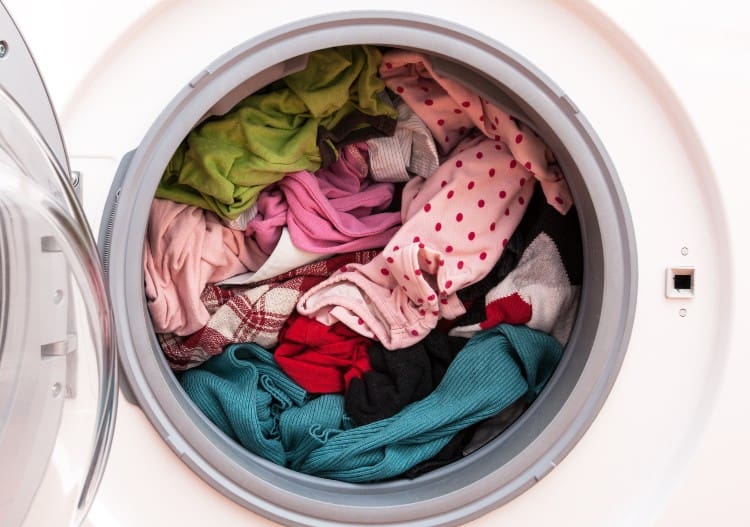
It is very tempting to shove as much as possible into the washing machine to get the laundry done more quickly. Unfortunately – this tactic will backfire. If the washing machine is overloaded, it just can’t do its job.
When stuffed full of clothes, there is not enough space to let water flow between items or for clothes to effectively agitate. Soap is not evenly distributed and clothes cannot be thoroughly cleaned. At an extreme – with clothes packed tightly enough together, some garments may never even get completely wet during the cycle.
With all of these factors stacked against us, it is best to stick with smaller loads of laundry. With ample space in the drum, clothes will be in full contact with the soapy water, which will be able to loosen and rinse away the dirt – and the smells. Similar to the issue of excessive detergent – this is especially important with high-efficiency machines. Less water is used in the first place, so extra clothes packed in will mean fewer clean clothes will come out.
4. Need Hotter Wash Water
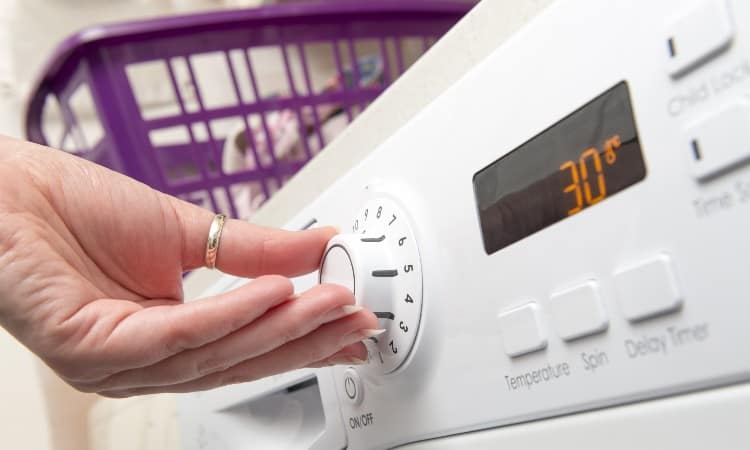
If you know your machine is clean, you’re using the correct amount of soap, and washing appropriately sized loads – it could be that the water needs to be hotter. This is usually the case if the clothes in the machine are particularly heavily soiled.
Cool and cold water wash cycles are attractive because they are more eco-friendly and use less energy – but for extremely dirty clothes, hot water may be necessary. Many bacteria that grow on clothes will not be killed off with cold water, so hot water could make all the difference.
Of course, it’s important to adhere to the care labels of the clothes that you’ll be washing. If possible – with heavily soiled loads especially – use the hottest water allowable for the material to help eliminate unwanted smells.
5. Clothes Were Left Sitting Wet for Too Long
Beyond the wash cycle itself – there are several reasons that clothes can smell bad even after they’ve been deemed clean. One of the most common issues is letting the clothes sit wet for too long before drying. When you throw a load of laundry in the machine and get caught up with another task, it’s too easy to forget the clothes in the washer.
Leaving wet clothes in the bottom of a dark washing machine is an invitation for mold and mildew to grow. Mildew is one of the main culprits for bad-smelling laundry, and it can start to grow in dark, wet places in a matter of hours.
To avoid wasting time and energy, pay special attention to removing clothes from the washing machine as soon as the wash cycle ends. It may be helpful to set a timer or alarm to remind you to check on the clothes – especially if you will be out of earshot from the machine’s own sounding device.
6. Clothes Not Dried Properly
When clothes are not allowed to dry properly, they can develop smells even if they didn’t smell directly after being washed. Putting too many clothes into the dryer is a common reason that clothes may not dry thoroughly. Just like a washing machine being overloaded – when an extra large load is put into a dryer, there is not enough space for the clothes to tumble.
Clothes tend to bunch and get stuck together; there’s just not enough airflow to reach every item. If at any point these clothes are left to sit, mildew will grow and create musty-smelling clothes.
Just like with washing – stick to drying smaller loads. It may seem like a bigger job initially, but it will save you time and extra work in the long run. Smaller loads also dry more efficiently – this will save you from having to re-wash and dry and save on energy costs.
7. Clothes Were Put Away Damp
Life is busy, and laundry’s not always at the top of the priority list. If the dryer buzzes and we have the time – why not just put the clothes away? The problem arises if this happens and the clothes don’t happen to be thoroughly dry. Putting clothes away damp is never a good idea! You’ll think you’re doing yourself a favor – getting the job done quickly. But when you go to wear something from a load that was put away damp, you’ll be disappointed to discover the smell.
Before pulling clothes from the dryer – and especially before they are folded to be put away – make sure that all items are thoroughly dry. Adding a few minutes of dry time might seem like an unnecessary hassle, but it will save you time in the end since your clothes are much less likely to develop unwanted smells.
8. Stored Clothes Do Not Have Enough Air Flow
Air flowing around garments keeps things smelling fresh and is a good way to prevent mildew, mold and other things that cause smells from growing. When clothes are tightly packed together, air cannot flow amongst them.
It’s easy for musty, dingy smells to develop when there isn’t enough air in the space. This can be a problem for clothes that are hanging, but this is especially the case for clothes in drawers or bureaus. Being surrounded by solid walls on all sides already lets little air in – packing clothes as tightly as they’ll fit removes the little excess air.
Leave enough room between garments to help clothes stay fresh by allowing air to flow around them. Especially for clothes you may not often wear – leaving space around clothes will make it less likely that they will develop bad smells over time.
Why Do My Clothes Smell Like “Wet Dog?”

One of the most terrible smells you can find on your clothes is that of “wet dog.” The only thing that makes it worse – is when the clothes have just been washed. Wet dog smell is often a result of using too much detergent.
Using too much detergent regularly leads to some serious build-up over time. It may not be apparent to the eye – but it certainly will be to the nose. If the build-up is concentrated enough, the smell can be present when the clothes are dry – and exponentially worse when wet.
If you find yourself with a laundry load smelling like a wet dog, you may need to follow the steps below to remove it. To prevent the smell from happening in the future – stick to the guidelines on detergent use – don’t use too much.
If you’re afraid you’ve added too much detergent by mistake, you can always run an extra rinse cycle to eliminate some of the excess soap. Smell the laundry after washing to make sure things seem fresh – if not, keep rinsing until all detergent has been washed away.
How To Remove Bad Smell From Clothes After Washing
If you’re past the point of prevention and find yourself with clothes that smell bad – all hope is not lost. Luckily, the easiest way to get musty, sour and stale-smelling laundry back to a fresh-smelling state can be done with – you guessed it – vinegar. Distilled white vinegar is your best friend when it comes to refreshing laundry – visually as well as when it comes to smells.
If the smell in the clothes is mild – but not great – the fix could be super simple. Add half a cup of vinegar at the beginning of the wash cycle and another cup with the final rinse to get clothes smelling neutral again. For more serious smells – like the wet dog discussed above – a longer soak may be necessary.
Use two cups of vinegar per gallon of water and make enough solution to fully submerge all smelly clothes. Allow the clothes to soak in the solution for at least an hour and overnight – then drain and wash as usual.
Don’t worry about clothes smelling like vinegar once they’ve completed the wash cycle. The musty, mildewy smells will have been neutralized – and any traces of vinegar will have washed away. Using vinegar regularly in your washing is a great way to maintain clean-smelling laundry and a clean machine! Feel free to add half a cup to just about any load – it works especially great on towels, which tend to generate buildup the fastest.
Why Do Clothes Smell After Drying?
It may be surprising to find that an otherwise clean-smelling load of laundry smells bad only after it’s removed from the dryer. The washing machine isn’t the only place where smelly clothes can occur. Airflow is of utmost importance when it comes to mechanical dryers. If the airflow is obstructed in the machine – a clean load of laundry can easily develop a foul smell.
When vents become blocked, the air gets trapped inside – this air is usually humid and moist – the perfect atmosphere for mildew and bacteria. The dryer’s job is to tumble and blow air through clothes – if the air is stale and musty, the clothes will become stale and musty-smelling too. It’s important to remove lint from the dryer filter after every drying cycle. Check all vents for debris regularly to help ensure there is always healthy airflow into the machine.
Conclusion
Doing laundry is a chore – there’s no doubt about it. But why do twice the work when you don’t have to? Knowing the best ways to keep clothes clean – and smelling clean – can save a lot of trouble and make the job much more pleasant.
The smell of just-cleaned laundry should be a reward for all the effort put forth. With a little maintenance and the 8 tips from above – you can be sure your clothes will smell fresh after every wash.